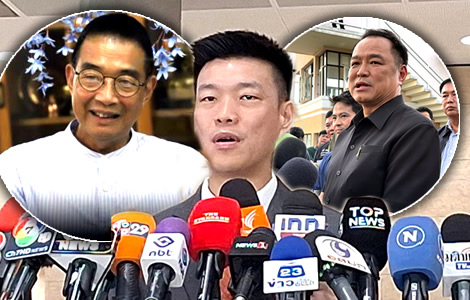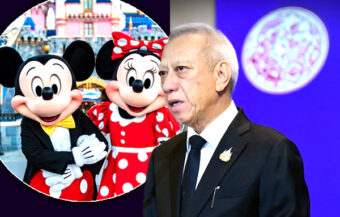Thailand descends into fresh political chaos as Anutin’s interim government fuels nationalism before the 2026 polls, blindsiding rivals with a referendum to scrap Cambodia MOUs while voters face deep confusion over a six-way ballot and new charter plans.
Thailand’s political climate is spiralling toward a tense General Election, tentatively set for March or April 2026 — though even that date is far from certain. Rival parties are locked in a fierce struggle to deliver a long-promised new constitution. In the meantime, Prime Minister Anutin Charnvirakul’s interim government has blindsided the opposition and the former ruling Pheu Thai Party with plans for a national referendum to scrap two landmark Memorandums of Understanding (MOUs) with Cambodia. Analysts say the ruling Bhumjaithai Party is stoking a wave of nationalism aimed at carrying it to full power in the upcoming polls. Meanwhile, a new NIDA poll shows 79.16% of Thais are confused by the government’s proposed six-way ballot — a vote that will decide the next constitution, a new government, and the fate of MOUs 43 and 44 with Cambodia

Thailand’s politics have again entered a period of deep uncertainty, marked by sharp divisions, shifting alliances, and rising nationalist sentiment. For outside observers, the kingdom’s political system remains opaque, complex and often contradictory.
Even seasoned diplomats and correspondents struggle to follow the manoeuvrings inside Bangkok’s power corridors.
At present, the country faces overlapping crises. Political paralysis, constitutional deadlock, and renewed border tensions with Cambodia have created an atmosphere of instability. The stakes are high. A new constitution is being proposed to replace the 2017 Charter, a document many blame for stifling democratic development and slowing economic progress.
2017 Charter rooted elite power and left governments weak as Anutin aligns with conservative forces
The 2017 Charter, born from the post-coup order, imposed sweeping controls on elected officials. It strengthened unelected institutions and tied the hands of successive governments. Critics argue it produced a political system designed to preserve elite influence while limiting accountability.
Nevertheless, the current administration, led by Bhumjaithai Party leader Anutin Charnvirakul, has signalled little appetite for sweeping change. Mr. Anutin was elected prime minister in early September after the collapse of the previous government, a collapse sparked by revelations over Thai-Cambodian relations and a damaging audio leak involving former Prime Minister Paetongtarn Shinawatra and Cambodian leader Hun Sen.
Mr. Anutin’s election realigned Thailand’s political landscape. His Bhumjaithai Party, traditionally pragmatic and regionally rooted, has now emerged as the new centre of conservative power. The move has placed him in alliance with establishment forces such as the Palang Pracharat Party, which remains firmly opposed to altering the 2017 constitution.
However, the decision also fractured the fragile coalition that brought the People’s Party to the heights of popularity. This cohort represents 65% of the voting public, which supports democratic reform. Many supporters of the pro-democracy Pheu Thai Party saw it as a betrayal. They had expected the People’s Party to back Pheu Thai’s candidate, former Attorney General and Justice Minister Chaikasem Nitisiri. Mr. Chaikasem, respected for his independence and courage before the 2014 coup, was widely viewed as a more trustworthy reformist alternative.
Nationalism rises as Bangkok pushes referendum to cancel Cambodia MOUs amid strained border relations
The political rupture has come at a sensitive time. Public confidence is waning, while economic recovery remains uneven. At the same time, nationalism is once again dominating public debate.
The government’s proposal to hold a referendum on cancelling two long-standing Memorandums of Understanding (MOUs) with Cambodia has reignited passions on both sides of the border.
These MOUs, signed in 2000 and 2001, set out frameworks for managing territorial disputes. They do not alter sovereignty or border lines but establish mechanisms for negotiation. Nonetheless, the agreements have been recast by nationalist groups as symbols of weakness.
Now, with relations between Bangkok and Phnom Penh strained, the government appears determined to capitalise on nationalist feeling. Mr. Anutin’s allies have linked the MOU debate to the constitutional referendum and general election, creating a politically charged “four ballots, six questions” event that few fully understand.
New NIDA poll reveals confusion over “four ballots, six questions” plan and four-month window
According to the National Institute of Development Administration (NIDA), public confusion is widespread. Its latest survey, released on October 12th, found that nearly half of respondents — 48.55% — said they were “very confused” about the upcoming polls. Another 30.61% said they were “somewhat confused.” Only 11.99% said they were not confused at all.
The same survey, conducted between October 7th and 9th among 1,310 adults nationwide, revealed mixed views about the government’s preparations. When asked whether the four-month timeline was sufficient to educate voters, 30.23% said it was “not enough at all,” while 24.43% said it was “definitely enough.” Another 22.14% called it “quite sufficient.”
Despite the confusion, 49.16% said they agreed with holding all votes on the same day. About one-quarter preferred the referendums and general election to be separated. The government argues that a single-day vote will save costs and demonstrate efficiency. Critics say it will overwhelm voters and blur distinctions between constitutional reform and nationalist politics.
Rival constitutional drafts deepen divisions as Pheu Thai’s proposal gains traction for its clarity and balance
The constitutional process itself remains mired in dispute. Three parties — the People’s Party, the Pheu Thai Party, and the Bhumjaithai Party — have submitted rival drafts. Each proposes a different size and structure for the Constituent Assembly, as well as varying timeframes for drafting the new charter.
Former Nakhon Si Thammarat MP Thepthai Senapong has emerged as a vocal supporter of the Pheu Thai Party’s draft. Writing on his “Thepthai – Talking Politics” social media page, he called the proposal “the most suitable, easy to understand, and uncomplicated.” The Pheu Thai plan envisions a 151-member assembly, a balance between public representation and parliamentary oversight.
In contrast, the People’s Party’s draft proposes 135 members, while Bhumjaithai’s version calls for 99. Mr. Thepthai argued that 151 members would allow diversity without inefficiency. He also supported Pheu Thai’s 180-day timeframe for completing the draft, describing it as “neither too long nor too short.”
Moreover, he defended the inclusion of 51 expert advisors in the Pheu Thai draft. Although some viewed this as excessive, he said it ensured technical depth and transparency. By comparison, Bhumjaithai’s proposal lists only 22 experts, while the People’s Party envisions 100 provincial advisory members selected through a more complicated process.
Debate over constitutional limits as Senate power looms and Bhumjaithai resists public participation
Mr. Thepthai also rejected calls to bar amendments to Chapters 1 and 2 of the constitution, which define Thailand as a unitary state under the monarchy. He argued that a people’s constitution should not begin with prohibitions. “If the final draft proves unacceptable,” he wrote, “the people can simply reject it in the referendum.”
However, the Bhumjaithai Party maintains that the drafting committee should be chosen entirely by parliament. This would effectively exclude the public from the selection process. Critics fear this approach could reproduce the top-down system embedded in the 2017 Charter.
Meanwhile, the Senate — now dominated by Bhumjaithai senators elected in controversial circumstances — retains significant power. It can veto proposals or delay implementation. Analysts believe the upper house will play a decisive role in shaping both the drafting process and the timing of the referendum.
Former foreign minister warns MOU cancellation could expose Thailand’s strategy and provoke conflict
Amid the political wrangling, foreign policy concerns are intensifying. Former Foreign Minister Maris Sangiampongsa recently warned that scrapping the MOUs with Cambodia would damage Thailand’s credibility. Speaking at a public forum in Bangkok on October 13th, he emphasised that the MOUs were negotiation tools, not territorial concessions.
“If they are cancelled,” Mr. Maris said, “we lose the framework for talks and reveal our position.” He stressed that the documents were confidential diplomatic instruments under executive discretion. Turning them into referendum issues, he warned, could expose Thailand’s negotiating strategy and provoke unnecessary conflict.
Former government spokesman Jakrapob Penkair agreed. He argued that the controversy was less about the MOUs and more about mobilising a far-right political agenda. “The MOUs are being used as a pretext,” he said. “This is a nationalist stage play designed for domestic consumption.”
International law experts have also weighed in. Lawyer Veerapat Pariyawong noted that border issues must be resolved through negotiation and mutual consent. “Thailand does not impose or coerce,” he said. “We act with dignity, respecting sovereignty and equality.”
Regional diplomacy seeks calm as Malaysia hosts four-party talks while doubts grow over timetable
Meanwhile, regional diplomacy continues. On October 13th, the Ministry of Foreign Affairs confirmed that senior diplomat Sihasak Phuangketkeow participated in four-party talks in Malaysia with representatives from the United States, Cambodia, and Malaysia. The meeting aimed to reduce tensions and reaffirm the ceasefire along the disputed border.
According to the ministry, Thailand emphasised the need for bilateral mechanisms, demining, and the removal of heavy weapons. It also called for cooperation against cross-border crime and pledged sincerity in implementing existing agreements. Officials expressed hope that Cambodia would respond in kind.
Domestically, however, uncertainty persists. Many commentators doubt that the proposed constitutional referendum will occur as planned. Others fear that any new constitution driven by the Bhumjaithai Party may be even more restrictive than the current one.
The 2017 Charter is already widely blamed for limiting economic flexibility. It centralised authority, weakened ministerial power, and discouraged decisive policymaking. As a result, Thailand has struggled to respond quickly to economic shocks or attract sustained foreign investment.
Thailand faces a critical political crossroads as reformists clash with entrenched elites over the nation’s future
Today, the country stands at a crossroads. On one side are reformists pushing for broader public participation and institutional change. On the other hand, entrenched elites seek to preserve stability through control.
The outcome of this struggle is unclear. Indeed, it is the same struggle that produced the country’s shameful history of military coup d’états. In short, a conservative bloc that refuses to let the country pursue its natural course. Instead of using the military, the same forces are now using legal and political methods.
Riot police sent to Sa Kaeo border flashpoint area with Cambodia as tension begin to rise sharply there
Pheu Thai revitalised as support for the People’s Party falls due to its shock support for Anutin as PM
According to the latest NIDA poll, 79.16% of the public say they are “confused or very confused” about the government’s plan. The figure highlights the communication gap between policymakers and the people they claim to represent.
For now, Thailand remains a nation in political flux. The government insists that reform and stability can proceed together. Yet, as deadlines tighten and tensions rise, many fear that the country’s next charter could entrench the very forces it aims to replace.
Join the Thai News forum, follow Thai Examiner on Facebook here
Receive all our stories as they come out on Telegram here
Follow Thai Examiner here
Further reading:
Steely new line being taken as Thailand toughens its Cambodian border posture. Families ordered out
PM confirms government’s referendum plan to scrap MOUs with Cambodia. Top People’s Party MP shocked
Leader of deadly scam gang in Cambodia and henchmen still at large with 4 more Thais arrested
Police in Cambodia close in on fake scam loan app leadership after family murders in Samut Prakan
Cambodian cybercrime industry run by Chinese criminals could be generating up to 38% of its GDP
Debt and ฿1.7 million loss to scammers drive man to murder his wife and two sons in Samut Prakan
Loan shark arrested in Nonthaburi for bullying a borrower charged an annual interest rate of 730%


















